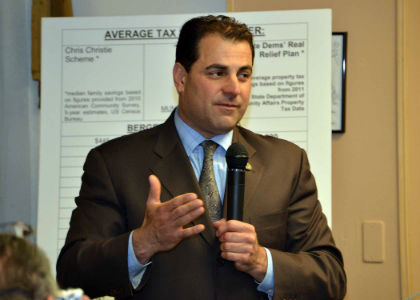
TRENTON — Faced with a fiscal crisis caused by the Governor’s budget practices and fueled by a chronically-poor state economy, Senate Democrats passed a fiscally responsible plan today that honors the state’s commitments and increases funding for critical services. The $34.1 billion budget makes the full pension payment, increases funding for critical services and ensures a surplus to protect against economic uncertainty.
“This is a fair and responsible budget that will help restore fiscal integrity to state finances,” said Senate President Steve Sweeney. “It is a balanced budget that meets all the state’s obligations. It keeps the promise to retirees and middle class workers by making the full contribution to the pension system. Abandoning that commitment is not only the wrong thing to do, it would cause pension costs to multiply in the years ahead and it would put the state at risk of more downgrades in our credit rating. I want to thank Chairman Sarlo for all his hard work and dedication in crafting this budget.”
“It’s true that we can’t afford to do everything we want, but we can’t afford to walk away from those in need,” said Senate Majority Leader Loretta Weinberg. “Our budget lives up to our obligations and meets important needs the governor has ignored with funding for cancer research, women’s health, legal services for the poor, tuition assistance for low-income students and tax credits for the working poor. These are priorities that should not be ignored. ”
“We stand at a watershed moment in New Jersey’s history where we can either propose real solutions to tough problems or we can point fingers and continue to dig a financial hole that one day may be too deep to climb out of,” said Senator Paul Sarlo, chairman of the Senate Budget and Appropriations Committee. “By approving this budget, we chose to make the difficult choices and in a responsible way. The governor has repeatedly created budget deficits and has caused the state’s credit rating to be downgraded six times. This budget restores our fiscal integrity and protects the people of New Jersey from fiscal problems.”
The FY 2015 budget (S-2015) was approved in the Senate by a vote of 24-16. The additional budget-related bills are scheduled to be considered by the Senate today.
Increased Funding to Meet the State’s Needs
- Restores Gov. Christie’s $7.4 million cut in funding to women’s health clinics and family planning services.
- Increases funding by $56 million for the Earned Income Tax Credit, which is aimed at the working poor. The increased funding will raise the credit from 20 to 25 percent of the federal rate. The governor’s past refusal to provide these funds was the same as a tax increase for the working poor.
- Invests in the state’s economic future and its public health with $20 million for cancer research, restoring Christie’s $10 million cut and providing another $10 million to fund additional research.
- Provides an additional $5 million for legal services for the poor, a critical service that helps low-income residents deal with predatory lending, domestic violence, landlord-tenant disputes or foreclosure.
- Provides $1.6 million in tuition assistance for low-income students to help them battle skyrocketing college costs.
- Provides $13.2 million in additional funding for community providers who serve the state’s developmentally disables and are struggling to remain open.
- Provides an additional $2.2 million in funding for domestic violence services, reversing five years of flat funding for these critical programs that help victims of rape domestic abuse.
- Provides $12.5 million in additional funding for nursing homes and assisted living facilities, addressing perennial underfunding of nursing homes reimbursement, which continues to lag the real cost of providing care.
New Revenues to Meet Our Obligations
- Raises the marginal tax rate on all incomes above $1 million to 10.75 percent, resulting in an additional $723 million in revenue.
- Gov. Christie proposed 42 tax increases aimed at generating $272.5 million in revenue, but Democrats eliminated $108 million worth of the proposed increases, including $70 million worth of tax increases that would have punished small business in urban districts.
- Includes one-year increase of 1.5 percent on the Corporate Business Tax, resulting in an additional $389 million in revenue.
- Relies on the nonpartisan Office of Legislative Service’s forecast for income tax collections, resulting in an additional $176 million in revenue.
- Imposes a temporary suspension of the state’s Business Employment Incentive Program, resulting in $175 million in saving.
- Relies on targeted spending reductions in over budgeted accounts, resulting in $100 million in savings.
Honor’s the State’s Commitment to Make Pension Funds Solvent
- Keeps the promise with a full contribution of $2.25 billion to the pension system. Abandoning that promise would result in higher interest costs and lower credit ratings.
- Requires the state to make quarterly pension payments, a shift that would help ensure payments are made and that they don’t fall victim to last minute budget cuts.
- Reverses a recent decision by the Christie administration and uses the increases in employees’ pension contributions required in 2011 to help pay down the pension funds’ liabilities instead of offsetting the state’s payments.
- Prevents the future costs from multiplying if payment is not made.
- Protects against downgrades in credit ratings.

